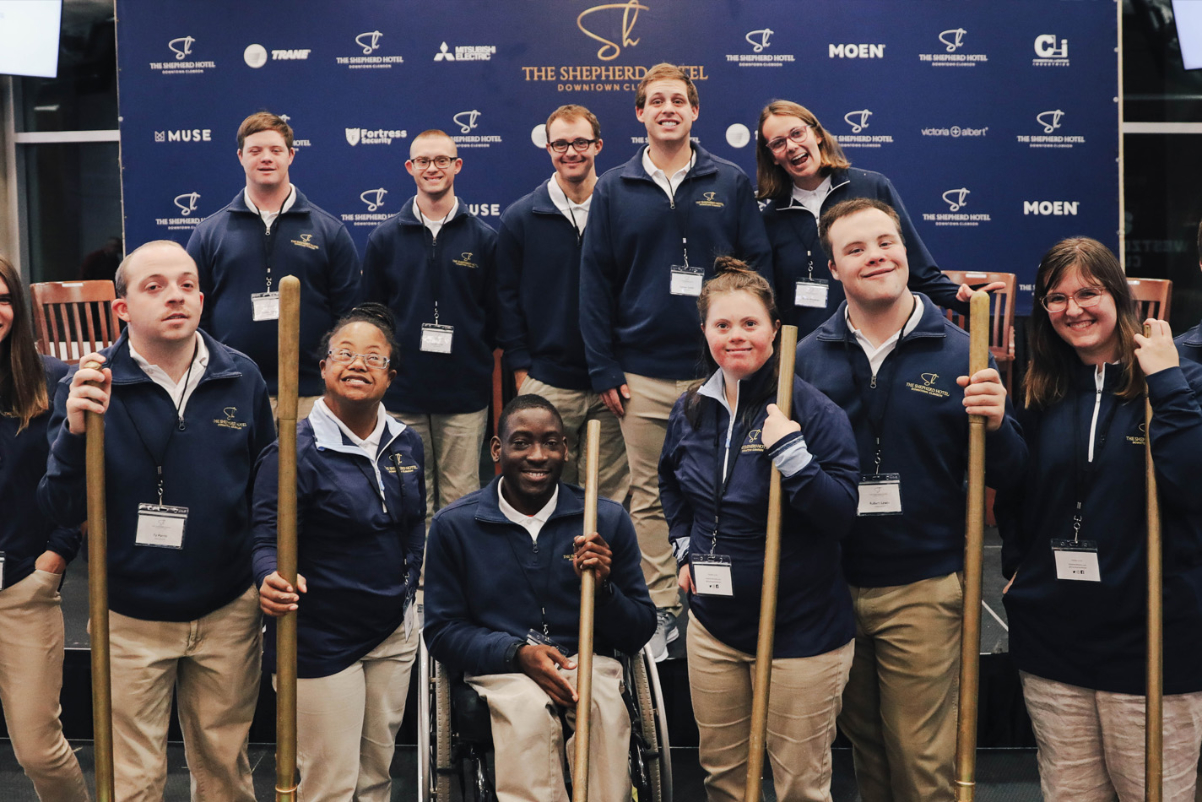Skift Take
Many travel companies want to foster a workforce where everyone, regardless of circumstances, can thrive. But many companies wonder how to go about doing this. The example of The Shepherd Hotel in Clemson, South Carolina, suggests one path.
The Shepherd Hotel will open in downtown Clemson, South Carolina, with a commitment that’s unusual among hotels. It plans to employ dozens of people with intellectual disabilities, many diagnosed with Down syndrome.
The 67-room hotel — officially opening in September but soft-launching this July — will be an independent boutique property. It has partnered with a Clemson University training program to hire 40 individuals with intellectual disabilities — making up about 40 percent of the property’s staff.
Rick Hayduk is spearheading the new hotel, his first brand built from scratch. Hayduk has decades of hospitality experience. Blackstone, the real estate investing giant, previously hired him as president of the Boca Raton Resort & Club in Florida and as the managing director of its South Seas Island Resort and the Inns of Sanibel.
Hayduk also has a personal interest in the project. One of his daughters, Jamison, has Down syndrome, as does one son, Abe. Another daughter, who graduated from Clemson, told him about a two-year training curriculum called ClemsonLIFE [learning is for everyone]. The hotel is now partnering with the program to source the employees.
Acting in a Hotel’s Enlightened Self-Interest
The Shepherd Hotel isn’t alone in this kind of effort. Accor’s Novotel Hangar in Salvador de Bahia, Brazil, works with a local association to sponsor apprentices with Down syndrome. Lemon Tree Hotels, India’s largest mid-market hotel chain, methodically hires people with disabilities. About a tenth of its staff work despite impairments.
Countries such as Germany, France, Japan, and South Korea require many employers to meet quotas for hiring people with impairments or else face penalties.
Hiring people with disabilities can create a more innovative operation, at least ideally.
Many hotels lazily accept spur-of-the-moment management. But planning is often critical to helping disabled workers navigate their workdays without getting derailed.
“In the special needs community, it’s all about confidence,” Hayduk said. “Reaching the plateau of confidence usually takes a little longer for someone with Down syndrome. If they face a lot of frustration and can’t get to the plateau, it’s doubly worse, because they’re at risk of shutting down faster.”
A well-organized and scheduled operation has the added benefit of helping all workers reduce errors.
Software choices offer another example. Hayduk saw his hotel would need better-than-average operational software.
The property is launching with Above Property Services (APS)’s “hotel in a box” software, which includes a full-service property management system.
“I said to them, ‘How can we get it so that some young person with an intellectual disability can check in a guest with something like six keystrokes?'” Hayduk said. “They said they’d figure it out, and they did.”
Some of the most commonly used systems for front-desk tasks are complicated and require weeks of training. That’s why it’s rare to see people with Down syndrome at front desks. The Shepherd Hotel wanted to change that. While the decision was prompted because of the workers with disabilities, all staff and customers may likely benefit from the simplified software.
“We want all of the staff to be excited to come to work,” said Aaron Shepherd, co-founder and CEO of APS. “Technology can drive a lot of that.”
A Bet With Risks
The Shepherd Hotel will open in a location that’s unusually walkable to campus compared to other properties. Developer Rich Davies believes that its restaurant and bar may help make it a local attraction and that a two-story spiral staircase from the lobby to the bar may make it Instagram-worthy.
The hotel will offer a premium product, which the local market doesn’t have. That may help it stand out, too.
But many college towns fail to deliver high average daily rates, so they tend to attract limited-service hotels, as Clemson has. The Shepherd Hotel may have to be very economically efficient to make the numbers work. Its investors aren’t likely to see the property throw off returns equal to, say, 20 percent of revenue they might find elsewhere.
The story of The Shepherd Hotel is still being written. To ease into things, it will soft-launch in June during a low season after the university’s semester is over. That will give the staff a few months to practice in a lower-stress situation.
This fall, it will likely run into some hiccups and need to adjust by learning. Yet the hotel already highlights a few potential lessons for other travel companies.
Travel companies aren’t necessarily experts in addressing the challenges that can hold people back. That’s why they should form partnerships with non-profits, community groups, and universities such as Clemson. These groups can help with the nuances, such as how hiring often has to be only part-time because some people will lose their government benefits if they’re employed full-time.
Workers from these overlooked groups often are grateful for being hired and stay loyal. Some studies suggest that the attrition rates for well-run programs are lower than the standard for non-disabled workers.
“The hotel industry is talking a lot about labor force challenges,” Hayduk said. “But there’s an untapped labor force out there.”
Have a confidential tip for Skift? Get in touch
Tags: accessibility, accessible travel, boutique hotels, disabilities, future of lodging, hotels, labor, south carolina, training
Photo credit: When the Shepherd Hotel opens in South Carolina, it will employ dozens of workers with intellectual disabilities like Down syndrome. Source: The Shepherd Hotel.
